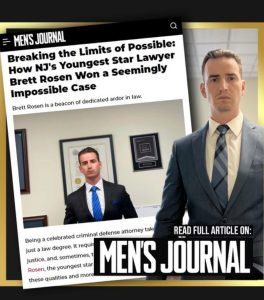Jury Trial vs. Bench Trial in New Jersey: Which is Right for Your Case? A Comprehensive Guide by Brett M. Rosen, Esq.
Jury Trial vs. Bench Trial in New Jersey

When facing criminal charges in New Jersey, you have a fundamental right to a trial. But what many people don’t realize is that there are two types of trials: a jury trial and a bench trial. Understanding the key differences between these two options is crucial in making informed decisions about your defense strategy. This comprehensive guide by Brett M. Rosen, Esq., a Certified by the Supreme Court of New Jersey as a Criminal Trial Attorney, explores the nuances of jury trials and bench trials, helping you determine which approach might be best suited for your case.
Jury Trial: Judgment by Your Peers
In a jury trial, a group of your peers – typically 12 citizens – are selected to hear the evidence and determine your guilt or innocence. The jury acts as the “finder of fact,” meaning they decide whether the prosecution has proven its case beyond a reasonable doubt. The judge’s role in a jury trial is primarily to ensure that the trial is conducted fairly and to instruct the jury on the law.
Key Features of a Jury Trial:
- Impartial Jury: The jury is selected through a process called “voir dire,” where potential jurors are questioned to ensure they can be fair and impartial.
- Unanimous Verdict: In most criminal cases, the jury must reach a unanimous verdict for a conviction or acquittal. If they cannot agree, it results in a “hung jury,” and the prosecution may choose to retry the case.
- Community Representation: A jury trial provides a sense of community involvement in the justice system, as ordinary citizens play a direct role in determining the outcome of a case.
- Potential for Jury Nullification: In rare cases, a jury may acquit a defendant even if they believe the defendant is technically guilty, if they disagree with the law or believe the law is being applied unfairly. This is known as jury nullification.
Bench Trial: Judgment by the Judge
In a bench trial, the judge serves as both the “finder of fact” and the “finder of law.” This means the judge hears the evidence, determines the facts of the case, and applies the law to reach a verdict. There is no jury involved in a bench trial.
Key Features of a Bench Trial:
- Judge’s Expertise: The judge is an experienced legal professional with a deep understanding of the law and court procedures.
- Efficiency: Bench trials are often faster and less complex than jury trials, as there is no need for jury selection or deliberations.
- Focus on Legal Arguments: Bench trials tend to focus more on legal arguments and interpretations of the law, which can be advantageous in cases with complex legal issues.
- Potential for Bias: While judges are expected to be impartial, there is always a potential for subconscious bias to influence their decision.
Which Type of Trial is Right for You?
The decision of whether to choose a jury trial or a bench trial is a strategic one that should be made in consultation with your attorney. Here are some factors to consider:
- Complexity of the Case: If your case involves complex legal issues or technical evidence, a bench trial might be preferable, as the judge has a deeper understanding of the law.
- Emotional Aspects: If your case is emotionally charged or involves sensitive issues, a jury trial might be advantageous, as jurors may be more likely to empathize with your situation.
- Publicity: If your case has received significant media attention, a bench trial might be preferable to avoid potential bias from jurors who have been exposed to media coverage.
- Strength of Evidence: If the evidence against you is weak or circumstantial, a jury trial might be advantageous, as it only takes one juror to have reasonable doubt for an acquittal.
- Your Comfort Level: Ultimately, the decision should also consider your personal comfort level and trust in either a judge or a jury to decide your fate.
Defenses in Criminal Cases
Regardless of whether you choose a jury trial or a bench trial, Brett M. Rosen, Esq. will explore all possible defenses to protect your rights and fight for the best possible outcome. Some common defenses in criminal cases include:
- Lack of Evidence: Challenging the sufficiency of the evidence against you.
- Constitutional Violations: Arguing that your constitutional rights were violated during the investigation or arrest.
- Affirmative Defenses: Raising defenses such as self-defense, duress, entrapment, or lack of intent.
- Challenging Witness Credibility: Attacking the credibility of witnesses who testify against you.
- Presenting an Alibi: Providing evidence that you were somewhere else at the time of the alleged crime.
FAQs about Jury Trials and Bench Trials in New Jersey
- Can I change my mind about the type of trial after I’ve made a decision?
- It might be possible to change your mind, but it depends on the specific circumstances and the judge’s discretion. It’s best to make an informed decision early on.
- What happens if I don’t choose a type of trial?
- In New Jersey, if you don’t make a choice, you will automatically be given a jury trial.
- How long does a jury trial typically last?
- The length of a jury trial varies depending on the complexity of the case. It can range from a few days to several weeks or even months.
- How long does a bench trial typically last?
- Bench trials are generally shorter than jury trials, as there is no jury selection or deliberations.
- What is the role of the judge in a jury trial?
- The judge ensures a fair trial, rules on legal issues, and instructs the jury on the law.
- What is the role of the jury in a bench trial?
- There is no jury in a bench trial. The judge decides the case.
Why Choose Brett M. Rosen, Esq. for Your Criminal Defense?

Brett M. Rosen, Esq. is a Certified Criminal Trial Attorney with a proven track record of success in both jury trials and bench trials. He has the knowledge, skill, and experience to guide you through the process of choosing the right type of trial for your case and to provide you with the best possible defense. He will:
- Thoroughly explain the differences between jury trials and bench trials.
- Analyze the strengths and weaknesses of your case and recommend the best trial strategy.
- Prepare you for trial, whether it’s before a judge or a jury.
- Present a compelling case and fight for your rights in court.
- Provide dedicated and personalized representation throughout the entire legal process.
If you are facing criminal charges in New Jersey, contact Brett M. Rosen, Esq. today for a free consultation. He is available 24/7 to discuss your case and provide expert legal guidance.
908-312-0368 & brett@nynjcriminalcivilesq.com
Disclaimer: This information is for informational purposes only and should not be considered legal advice. It is essential to consult with an attorney to discuss your specific legal situation.
